- Home
- Tricia Stringer
Heart of the Country
Heart of the Country Read online
Heart of the
Country
TRICIA
STRINGER
www.harlequinbooks.com.au
Also by Tricia Stringer
Queen of the Road
Right as Rain
Riverboat Point
About the Author
Tricia Stringer grew up on a farm in country South Australia. A mother of three wonderful grown-up children and Nanna to two boys, Tricia now lives in the beautiful Copper Coast region with her husband, Daryl.
Most of Tricia’s life so far has been spent in rural communities, as owner of a post office and bookshop, as a teacher and librarian, and now as a full-time writer. She loves travelling and exploring Australia’s diverse communities and landscapes, and shares this passion for the country and its people through her stories. One of Tricia’s rural romances, Queen of the Road, won the Romance Writers of Australia’s Romantic Book of the Year award in 2013.
Heart of the Country is Tricia’s fourth book with Harlequin.
www.triciastringer.com
www.facebook.com/triciastringerauthor
@tricia_stringer
For Daryl
Contents
Also by Tricia Stringer
About the Author
Prologue
One
Two
Three
Four
Five
Six
Seven
Eight
Nine
Ten
Eleven
Twelve
Thirteen
Fourteen
Fifteen
Sixteen
Seventeen
Eighteen
Nineteen
Twenty
Twenty-one
Twenty-two
Twenty-three
Twenty-four
Twenty-five
Twenty-six
Twenty-seven
Twenty-eight
Twenty-nine
Thirty
Thirty-one
Thirty-two
Thirty-three
Thirty-four
Thirty-five
Thirty-six
Thirty-seven
Thirty-eight
Thirty-nine
Forty
Forty-one
Forty-two
Forty-three
Forty-four
Forty-five
Forty-six
Forty-seven
Forty-eight
Forty-nine
Fifty
Fifty-one
Fifty-two
Fifty-three
Fifty-four
Fifty-five
Fifty-six
Fifty-seven
Fifty-eight
Fifty-nine
Sixty
Sixty-one
Sixty-two
Sixty-three
Sixty-four
Sixty-five
Sixty-six
Sixty-seven
Author Note’s
Acknowledgments
Prologue
The ancient rock shimmered in the afternoon sun, absorbing and reflecting the heat as it had done for thousands of years. Above it, the sheer cliffs were dotted with the twisted forms of straggling gums and adorned with the stories of ancient humanity. Below it, the dark pool of permanent water rippled, hiding in its depths the primordial stones washed there from another time.
In the hollows and ledges around the edge of the pool, several men rested, their dark skins blending with the shadows created by overhanging rocks and towering gum trees. The group were conserving their energy for the final stage of their journey home.
Only one man moved: their leader, Yardu. He was high in a red gum, braced in the fork of the tree, and the stiff rush gripped firmly between his teeth was already threaded with several of the delicious fat grubs he relished. He inserted his barbed stick carefully into the last of the little tunnels then began to wiggle the fat delicacy out of its burrow. This one would be for his wife.
A loud crack echoed across the valley, followed by a scream. Yardu jerked and the grub slipped from the hook and bounced away down the smooth trunk. He grabbed at the tree. The cry had sounded like his wife’s, but he was still a long walk from home. He pushed his back hard against the branch behind him and listened. Perhaps his longing for her had conjured up her voice.
The cry came again, shouting rather than calling, then a scream he didn’t recognise. It rippled down his spine. Perhaps an animal, though not one he’d heard before.
Yardu slipped his barbed hook safely into the pouch hanging from the band around his waist and, still gripping the rush between his teeth, he stretched his toes to find the first notch below him. A distant bang reverberated through the trees and this time the men below him must have heard it. They called to each other and to him uneasily. It had been a sharp crack, like a gum branch makes when it suddenly drops after long periods of dry, but this sound was too loud for that, and had echoed to his ears from a distance.
Yardu slipped and slithered down the tree. Before his feet reached the ground his brothers and uncles began talking at once. He held up a hand. He wasn’t the oldest of the group but he had earned their respect; they stopped. None of them spoke as he stowed the grubs in his bag. They would eat them later.
“We must go,” he said. He walked away from the waterhole, around the edge of the ridge and into the valley towards home. Down in the bush no more strange noises reached his ears, but the silence didn’t ease the dread in Yardu’s chest.
One
1846
The biting wind tugged at Thomas Baker’s hat as he turned the corner. He pressed it tightly to his head with his hand and bent into the wind. Another miserable day in Adelaide but he would not be deterred from his purpose. He kept to the wooden palings that served as a footpath in front of the assorted stone buildings that made up Hindley Street. Most were single storey, and on this part of the street there were no verandahs. The few people brave enough to be out huddled against the cold with bowed heads and moved quickly. Horses and carts churned along the muddy street. Thomas hunched his shoulders and pulled his coat tighter against the chill, thankful at least that he wasn’t wielding a shovel trying to keep the road passable.
He came to a stop in front of a white picket fence and peered up at the sign suspended from a wooden post. The Black Bull Hotel was written in bold lettering and beside it someone had painted a picture of a serene-looking bull. This was the place. He pushed open the gate. Below the name of the hotel there were more words in smaller print.
The bull is tame, so fear him not, so long as you can pay your shot. When money’s gone and credit’s bad, that’s what makes the bull go mad.
The warning in the words fitted the brooding appearance of the grey stone establishment. A short sharp shower of rain propelled him forward. He shook the drops from his coat and ducked his head through the door.
Inside the hotel, he stopped and peered through the smoky air and was pleased to see a fire flickering in the grate. A bar ran the length of the large rectangular room and several rough tables and chairs were scattered along the opposite wall. Most of the occupants stood, crowding the space in front of the bar. They were a rough-looking lot; from their dress they were mainly sailors and bushmen.
Raucous laughter and a jaunty female voice drew his gaze to the bar. A barmaid was flirting with the men in front of her as she set down their drinks. She glanced in his direction, but he looked away. He had no intention of buying a drink. With any luck he could conduct his business and be on his way quickly. He sought one man in particular but he could see no-one who met the basic description he’d been given. He squeezed behind two sailors arguing about who
se turn it was to buy the next drink. One of them swayed and someone knocked hard against him. Men complained around him. He collided with a chair.
“Steady up.”
“Beg your pardon, sir.” Thomas dipped his head to the seated man he’d almost fallen over. Even though his clothes were unlike any Thomas had seen a gentleman wear, the tone of the man’s voice and his stature put him a cut above the rest of the patrons. The man gave him a good look then went back to eating the food in front of him.
Thomas edged into the corner. The sight of the gentleman’s steaming bowl reminded him he’d eaten nothing since the pitiful porridge he’d been given at his lodgings that morning. He eased off his damp outer garment and hooked it over the back of the chair. At least from here he could better inspect those at the bar and he would see anyone who came in the door.
Slowly the warmth of the room thawed him. So far the fourteen grey, damp days he’d passed in Adelaide had done little but remind him of the miserable cold of England. They had shown no signs of producing the fresh start his father had predicted. But today would be different. The fledgling hope that had been with him as he stepped ashore all those weeks back, and which had gradually ebbed away, was strong in his chest again. Today was the start of something new.
A pot of ale hit the table in front of him with a thud. He lifted his eyes to those of the barmaid. She leaned in. He pulled his head back from the smell of sour beer and sweat.
“If you’re going to sit here you have to buy a drink.”
The lilt of her Irish voice reminded him of the girl who’d been the cook’s assistant back home, but the barmaid was nothing like Bernadette, who’d made his face heat with her flirting. There were deep lines around this woman’s eyes and mouth and her cheeks were ruddy. From across the room it had looked like a youthful glow but now he could see the skin was rough and the glow probably the product of her employer’s slops.
“No, thank you.” He frowned at her. “I don’t want it.”
“This is a pub. Everyone wants it.” She rolled her eyes and pushed her barely covered bosom closer. “Especially a good-looking feller like you.”
Thomas started to rise but the barmaid put a hand on his chest and pushed him back.
“Sure, you’ve enough for one drink.”
He looked over her shoulder through a gap in the crowd to the bar, where the bartender was watching them intently. The woman was right: if he was going to sit here any longer he needed a drink or he’d draw more attention to himself than he wanted.
He slipped a hand into his pocket for his money pouch. The pocket was empty. He patted his pants and reached for his jacket. No pouch there either. He must have left it in his trunk when he repacked it that morning. “I don’t have my pouch.”
“Cut the games.” The barmaid fixed him with her small round eyes. “Pay for your ale or leave.”
Thomas hesitated. He recalled the menacing words painted on the sign outside. He had notes concealed inside his shirt but he was reluctant to reveal them here.
A large hand appeared between them and slapped some coins on the rough wooden surface. Thomas looked up into the eyes of the gentleman from the next table. In spite of his clean-shaven face he had a rugged appearance, but none of that changed Thomas’s earlier impression that he had the air of a gentleman.
“I’ll shout the gentleman; and one more for me thank you, Mary,” the man said.
Before Thomas could protest Mary had scooped up the coins. “Thank you, Mr Browne.” She did a small bob and was gone, weaving skilfully through the crowd to the bar.
Thomas studied the man who’d come to his aid. “You’re Mr Browne?” he said.
The man’s sharp gaze locked on Thomas. “That’s me. Who are you?”
“Thomas Baker. I’ve come about the job. I’m sorry I didn’t recognise you. I was told you had long hair and a beard.”
Mr Browne gave a hearty laugh. “I did until this morning. I’ve been out of town a long time with only sheep for company. I’ve just come from the barber shop.” He studied Thomas. “You’re early, and not what I was expecting.”
“I can work as hard as any man.” Thomas pulled back his shoulders and lifted his head as the older man looked him over. This was not how he’d intended to approach his prospective employer.
“Well, Thomas, since we’re sharing a drink, is it all right if I move myself to your table?”
Before he could answer, Mr Browne took up his bowl and moved it across, then shifted his large frame into the chair alongside. The smell of some kind of stew reached Thomas’s nostrils. His mouth watered and his eyes were drawn to the bowl.
Another pot of ale appeared at the table.
“Mary, bring us another bowl of whatever this is.” Mr Browne waved his hand over his food and dropped more coins on the table.
“It’s Irish stew, Mr Browne, me old mam’s recipe.”
“Whatever it is, we’ll have another for my new friend.”
Once again Thomas began to protest but Mary had taken the coins and gone.
“You look like you could do with a good feed.”
“It’s very kind of you, Mr Browne, but –”
“The name’s Andrew James Browne. People call me AJ.” He reached out and gripped Thomas’s hand in a firm shake. His face crinkled into a smile then he pointed to his bowl. “You’ll be hard pressed to find much mutton in the stew. Mostly potatoes and onion, but it’s tasty all the same.”
“Thank you. I’m not sure how I can repay your kindness.”
“It’s not necessary.”
Thomas sat back quickly as Mary plonked a bowl of stew in front of him. His stomach rumbled in anticipation.
“Eat your fill.” A deep chuckle gurgled from AJ’s throat and he ate from his own bowl.
Thomas did the same, and by the time he’d swallowed the last mouthful the stew had warmed his insides and the ale had warmed his blood.
AJ sat back and folded his arms across his broad chest. “So Thomas Baker. What brings you to the new colony of South Australia?”
“It was my father’s idea originally.” Thomas paused, not sure how much of his story he should tell his prospective employer. “He worked back in England managing a farm. After my mother died he decided we should make a new start.”
“I’m sorry for you loss. What kind of work are you and your father looking for or has he already found employment?”
Thomas hesitated. “My father died aboard ship on the way here.”
The sharp gaze that studied Thomas softened. “Once more, I am sorry,” AJ said.
Thomas clenched his jaw. The promise of a new start had been the only thing to brighten their days since his mother’s death. They’d heard Australia was a wonderful new land with plenty of work and money to be made. His father had taken their meagre savings and accepted cheap passage to South Australia but he had not taken to ship life, succumbing to constant sea sickness which had finally killed him just before they’d reached Adelaide. For a moment, Thomas was transported to his father’s burial and the memory of the weighted shroud as it slid from the board and plunged into the rough ocean below. The mournful tolling of the bell marked the moment, as Thomas braced himself against the railing, gusts of wind ripping at his coat and wailing through the rigging. The waves had swallowed his father’s body, and slammed against the wooden hull.
He took a deep breath. Their employers, the Dowlings, had made a mockery of his father’s decision, called them both fools as they’d left and warned them not to come crawling back looking for handouts. Perhaps the Dowlings had been right … Now there was only Thomas, the last of their money hidden inside his shirt, and the two trunks of basic items they’d brought with them.
“Have you worked before with animals?” AJ’s question cut into Thomas’s thoughts.
He swallowed his grief once more and gave his full attention to the man opposite. “Yes. The farm I worked on had sheep and there were cows to be milked. We also helped with the horses.”
AJ studied him closely. “You’re not quite what I was expecting.”
Thomas felt as if his deception was written all over his face. His job at the Dowlings had been footman. He’d only assisted his father in his rare moments of spare time.
“In what way?”
“I was hoping for someone more robust.”
“I was very sea sick on the trip out,” Thomas said quickly. “I’ve lost weight but I’m strong.” He hoped the good Lord would forgive him his lies but he needed this job and after the labouring work of the last few weeks he had certainly built up some strength. The rain that had fallen on his arrival in South Australia had hardly let up and the streets of Adelaide had turned to slush. He’d been given rough lodgings in Emigration Square and in return he’d been sent to work with a few other men. No sooner had they shovelled and scraped the roads into a traversable surface than it rained again and a fresh lot of horses and drays passed by, causing the ruts and pot holes to return.
AJ pursed his lips and drew a watch from his top pocket. He opened it, peered at the face, then snapped it shut. “I’m sorry for all that’s befallen you, Thomas, but I don’t know if you’re suited to my needs.”
Thomas drew himself up. “I am quite used to hard work if that’s what bothers you.”
“Rest assured,” AJ reached across and gave him a firm pat on the shoulder, “I didn’t take you as a man not prepared to work for his living. I was hoping for someone with a little more experience. There were a couple of men interested.”
Thomas held AJ’s gaze. He could see the older man was weighing something up.
“Whatever the work is, I am sure I am up to it,” Thomas said.
AJ studied him a moment longer then his face relaxed into a smile. “You remind me of myself ten years ago. I came to Australia in similar circumstances, although not orphaned, I had only the clothes on my back and little money. I learned as I went. Hard work has stood me well.” He leaned forward and the smile dropped from his face. “I’ll tell you what I need, Thomas Baker. You may well change your mind once you’ve heard me out.”
Thomas recalled his father had used nearly the same words before he’d told of his plan to leave England. He needed to do this, not only for himself but for his father. He pulled back his shoulders and clasped his hands firmly together.

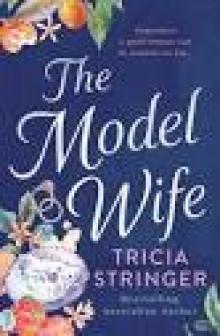 The Model Wife
The Model Wife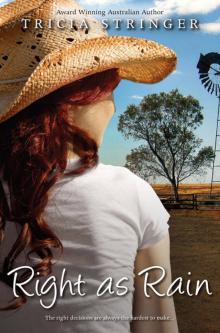 Right As Rain
Right As Rain Something in the Wine
Something in the Wine Between the Vines
Between the Vines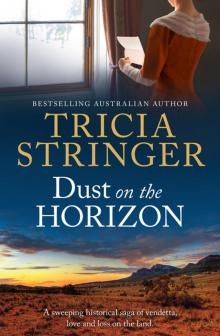 Dust on the Horizon
Dust on the Horizon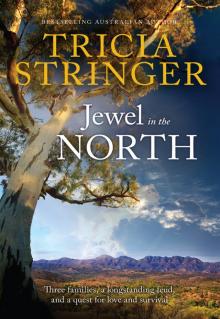 Jewel In the North
Jewel In the North Riverboat Point
Riverboat Point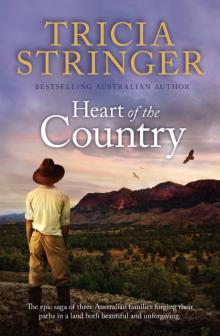 Heart of the Country
Heart of the Country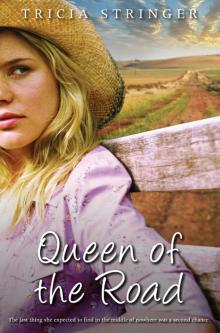 Queen of the Road
Queen of the Road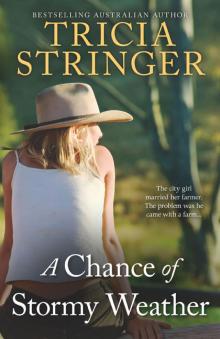 A Chance of Stormy Weather
A Chance of Stormy Weather Table For Eight
Table For Eight